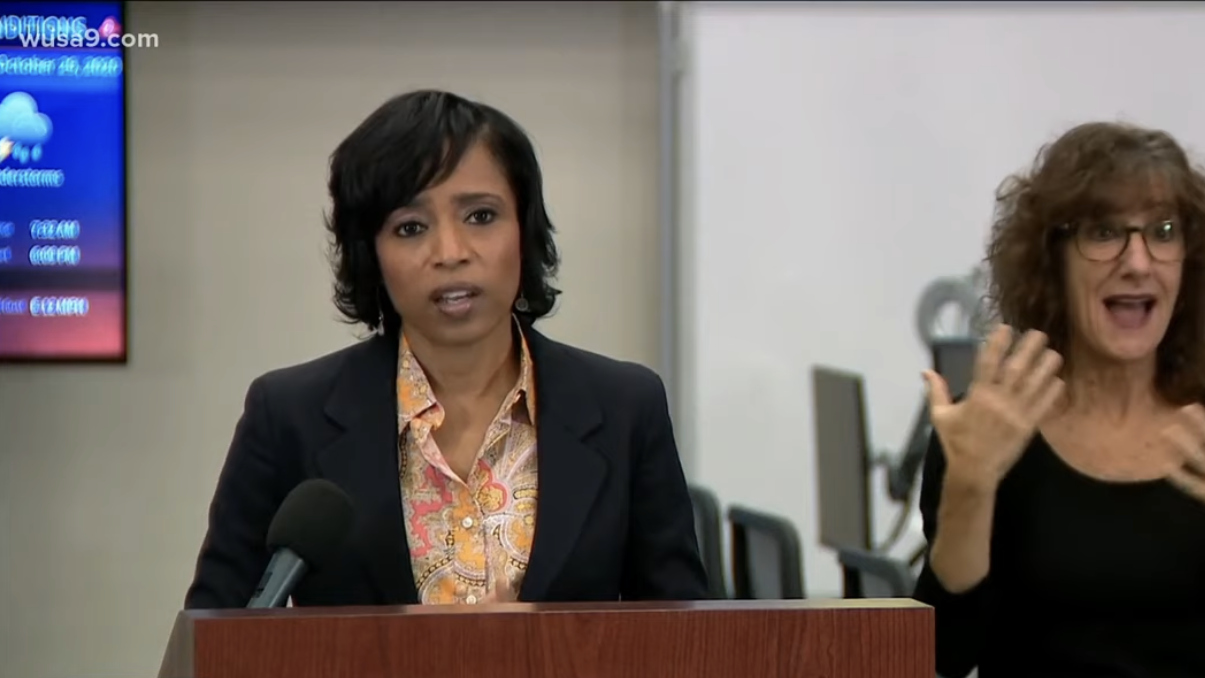Prince George’s County will adopt 46 of the 50 recommendations submitted by the county’s police reform work group, County Executive Angela Alsobrooks announced at a press conference Friday.
Alsobrooks established the work group last year to investigate areas for improvement within the police department. The group identified several main problems, said Alonzo Washington, a co-chair of the work group and Maryland state delegate.
There were issues with hiring and recruitment, minimal transparency with community complaints, high levels of misconduct and excessive use of force from officers, poor data collection procedures and data analysis, lack of oversight and accountability and a low to moderate trust between the police department and the community, Washington said.
Here are some of the most noteworthy reforms the county adopted:
Community Engagement
The county will push to dismantle the school-to-prison pipeline — a national trend where kids are funneled from public schools into the juvenile and criminal justice systems.
To do so, the reform group recommended the county invest in mental health programs and increase the number of school counselors, community intervention workers and restorative justice coordinators, according to the group’s report.
Additionally, school security personnel will no longer have the power to arrest students, Washington said. There will be updated school safety training requirements for teachers, administrators and school resource officers.
In addition, the county will overhaul how it addresses mental health crises. It will create a county mental health crisis facility and a mobile crisis team. The reform group recommended the crisis team include a mental health professional and an officer trained in crisis intervention to respond to calls.
The county will also establish the position of community services division director, which will oversee community engagement and directly report to the police chief.
[County cancels nonresident COVID vaccination appointments to prioritize Prince Georgians]
Employee Recruitment and Retention
The county will also make an effort to recruit qualified, diverse individuals, creating monetary incentives for officers to live in the community that they work in.
The county will invest in annual evaluations of their officers’ mental health and establish an officer wellness program. The recommended program consists of a pilot intervention system for officers in crisis that includes improving support from peers, providing counselors and relaxation techniques.
“We know that officers who have the right to ask for help when they need it, better serve their communities and have more fulfilling careers as a result,” Alsobrooks said.
Financial Management
The county police budget will be reimagined in order to effectively deliver community-focused policing, Alsobrooks said.
This increased transparency will include an annual financial audit of all PGPD payouts, lawsuits, settlements and fines.
Independent Oversight Compliance and Integrity
The county will establish the Office of Integrity and Compliance, led by the county’s inspector general’s office. The new office will include investigative staff and a race and gender equity director, Washington said.
The inspector general will also be moved out of the police station and instead report to the deputy chief administrative officer for public safety and homeland security, Alsobrooks said. A more “robust and equitable” citizen complaint oversight panel will also be established, Alsobrooks added.
[UMD organizations fight to reform policing on campus]
Internal Policies and Regulations
The county will create a public dashboard that includes a record of all traffic stops and subsequent actions, no-knock and nighttime search warrants, the use of flash bangs and other police actions.
More officers will wear body cameras to document their interactions, Alsobrooks said. She did not say how much of an increase there would be.
Additionally, a more robust customer service campaign will be established, as well as an updated use of force policy. The policy includes a “duty to intervene” policy, meaning if an officer witnesses the use of illegal force on a person, they will have to stop that use of force.
Rejected Recommendations
The county did not accept four of the group’s recommendations.
The first would have increased funding for the diversion expansion program through collaboration between the department’s and state attorney’s office. The program aims to redirect young offenders from the justice system. It was omitted because of a redundancy in current diversion programs with the county circuit court, said Ryan Middleton, project manager of the work group.
The second recommendation asked for a review of the current funding that has been allocated for specialty police units. That recommendation fell under the overall review of the department’s total budget, so the county omitted it.
The third rejected recommendation called for a removal of racial biases within the gang and criminal organization registry, as well as updating policies regarding that database. But the federal government operates that database, Middleton said, which is why it was omitted.
The fourth recommendation had asked for the transfer of traffic enforcement from the police department to the county’s revenue authority. But that transfer could possibly have led to mismanagement and “unforeseen consequences,” Middleton said.
But Washington said the recommendations that the county accepted are necessary and beneficial.
“Today with the help of this county executive, we take the first actions to balance the scales of justice, to protect all of our residents in Prince George’s county,” Washington said.



